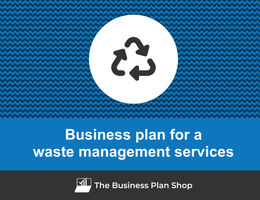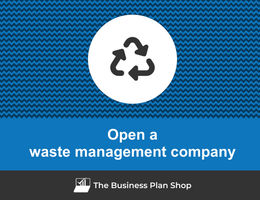How to create a financial forecast for a waste management company?
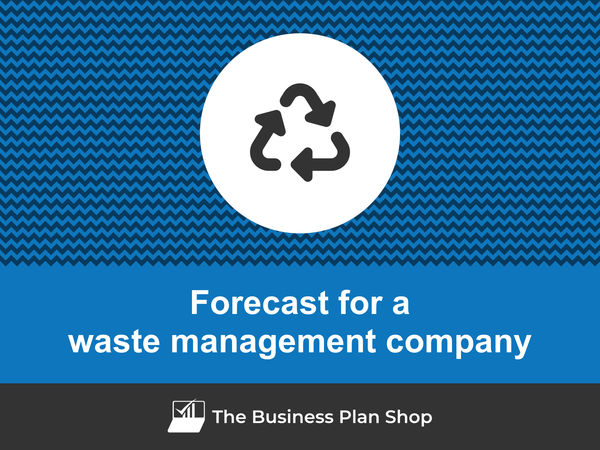
If you are serious about keeping visibility on your future cash flows, then you need to build and maintain a financial forecast for your waste management company.
Putting together a waste management company financial forecast may sound complex, but don’t worry, with the right tool, it’s easier than it looks, and The Business Plan Shop is here to guide you.
In this practical guide, we'll cover everything you need to know about building financial projections for your waste management company.
We will start by looking at why they are key, what information is needed, what a forecast looks like once completed, and what solutions you can use to create yours.
Let's dive in!
Why create and maintain a financial forecast for a waste management company?
The financial projections for your waste management company act as a financial blueprint to guide its growth with confidence and ensure its long-term financial viability.
To create them, you will need to look at your business in detail - from sales to operating costs and investments - to assess how much profit it can generate in the years to come and what will be the associated cash flows.
During challenging market conditions, maintaining an up-to-date financial forecast enables early detection of potential financial shortfalls, allowing for timely adjustments or securing financing before facing a cash crisis.
Your waste management company's financial forecast will also prove invaluable when seeking financing. Banks and investors will undoubtedly request a thorough examination of your financial figures, making precision and presentation essential.
Need a convincing business plan?
The Business Plan Shop makes it easy to create a financial forecast to assess the potential profitability of your projects, and write a business plan that’ll wow investors.

What information is needed to build a waste management company financial forecast?
The quality of your inputs is key when it comes to financial modelling: no matter how good the model is, if your inputs are off, so will the forecast.
If you are building a financial plan to start a waste management company, you will need to have done your market research and have a clear picture of your sales and marketing strategies so that you can project revenues with confidence.
You will also need to have a clear idea of what resources will be required to operate the waste management company on a daily basis, and to have done your research with regard to the equipment needed to launch your venture (see further down this guide).
If you are creating a financial forecast of an existing waste management company, things are usually simpler as you will be able to use your historical accounting data as a budgeting base, and complement that with your team’s view on what lies ahead for the years to come.
Let's now zoom in on what will go in your waste management company's financial forecast.
The sales forecast for a waste management company
From experience, it usually makes sense to start your waste management company's financial projection with the revenues forecast.
The inputs used to forecast your sales will include the historical trading data of your waste management company (which can be used as a starting point for existing businesses) and the data collected in your market research (which both new ventures and existing businesses need to project their sales forward).
Your waste management company's sales forecast can be broken down into two key estimates:
- The average price
- The number of monthly transactions
To assess these variables accurately, you will need to consider the following factors:
- You may see an increase in the average price of transactions if there is an uptick in the demand for recycling services. This could be due to new laws or regulations mandating recycling, or a shift in public perception towards sustainability and eco-friendliness.
- If there is a shortage of landfill space in your area, you may be able to charge a premium for waste disposal services. This could be caused by stricter regulations on landfills or a population increase in your region.
- Changes in fuel prices can have a significant impact on your average price per transaction. Higher fuel costs may result in increased operating expenses, which could be reflected in the prices you charge for your services.
- If there is a sudden surge in construction projects in your area, you may see an increase in the number of transactions. Construction sites generate a lot of waste, and your company may be the go-to for waste management services.
- Weather can also affect your business's average price and number of transactions. Extreme weather events, such as hurricanes or floods, can result in a higher demand for debris removal and cleanup services, potentially driving up prices and increasing the number of transactions.
Once you have a sales forecast in place, the next step will be to work on your overhead budget. Let’s have a look at that now.
Need a convincing business plan?
The Business Plan Shop makes it easy to create a financial forecast to assess the potential profitability of your projects, and write a business plan that’ll wow investors.

The operating expenses for a waste management company
Once you know what level of sales you can expect, you can start budgeting the expenses required to operate your waste management company on a daily basis.
Expenses normally vary based on how much revenue you anticipate (which is why, from experience, it is always better to start your forecast with the topline projection), and where your business is based.
Operating expenses for a waste management company will include some of the following items:
- Staff costs: This includes salaries, wages, benefits, and training for employees such as waste collectors, drivers, and administrative staff.
- Accountancy fees: You will need to hire an accountant or accounting firm to manage your financial records, tax payments, and reporting.
- Insurance costs: As a waste management company, you will need to have insurance coverage for your vehicles, equipment, and liability in case of accidents or damages.
- Software licenses: You may need to purchase or renew licenses for software programs that help with managing waste collection, tracking inventory, and recording financial data.
- Banking fees: Your company will have to pay fees for banking services, such as transaction fees, wire transfers, and account maintenance fees.
- Fuel and vehicle maintenance: This includes the cost of fuel for your waste collection trucks and any maintenance or repair costs.
- Equipment maintenance: You will need to regularly maintain and repair your waste management equipment, such as garbage trucks, recycling machinery, and landfill equipment.
- Supplies and materials: This covers the cost of purchasing supplies and materials needed for daily operations, such as bins, gloves, and cleaning products.
- Rent or lease: If you do not own your business premises, you will need to pay rent or lease fees for your office, storage space, and landfill site.
- Utilities: You will have to cover the cost of electricity, water, and other utilities used in your office, landfill site, and equipment.
- Marketing and advertising: To attract clients and raise awareness of your waste management services, you may need to spend money on marketing and advertising campaigns.
- Legal fees: There may be legal costs associated with obtaining necessary permits and licenses, as well as any legal fees for handling disputes or liability claims.
- Training and development: It is important to invest in training and development for your employees to improve their skills and knowledge in waste management processes.
- Waste disposal fees: Your company will have to pay fees for disposing of waste at designated facilities, such as landfills or recycling centers.
- Vehicle registration and taxes: You will need to register and pay taxes for your waste collection vehicles, which may vary depending on the size and type of vehicle.
This list will need to be tailored to the specificities of your waste management company, but should offer a good starting point for your budget.
What investments are needed to start or grow a waste management company?
Once you have an idea of how much sales you could achieve and what it will cost to run your waste management company, it is time to look into the equipment required to launch or expand the activity.
For a waste management company, capital expenditures and initial working capital items could include:
- Waste Collection Vehicles: As a waste management company, you will need to invest in specialized vehicles for waste collection, such as garbage trucks, recycling trucks, and hazardous waste disposal trucks.
- Waste Processing Equipment: This includes equipment for sorting, shredding, compacting, and recycling waste materials. Examples may include balers, shredders, compactors, and sorting machines.
- Landfill Development: If your company operates a landfill, you may need to invest in land development, such as creating access roads, building retaining walls, and installing drainage systems.
- Hazardous Waste Storage Facilities: If your company handles hazardous waste, you will need to invest in storage facilities that comply with environmental regulations. This may include specialized containers, tanks, and buildings.
- Waste Management Software: In order to effectively manage and track waste collection, processing, and disposal, you may need to invest in waste management software. This can help with routing, scheduling, and invoicing processes.
Again, this list will need to be adjusted according to the specificities of your waste management company.
Need a convincing business plan?
The Business Plan Shop makes it easy to create a financial forecast to assess the potential profitability of your projects, and write a business plan that’ll wow investors.

The financing plan of your waste management company
The next step in the creation of your financial forecast for your waste management company is to think about how you might finance your business.
You will have to assess how much capital will come from shareholders (equity) and how much can be secured through banks.
Bank loans will have to be modelled so that you can separate the interest expenses from the repayments of principal, and include all this data in your forecast.
Issuing share capital and obtaining a bank loan are two of the most common ways that entrepreneurs finance their businesses.
What tables compose the financial plan for a waste management company?
Now let's have a look at the main output tables of your waste management company's financial forecast.
The projected profit & loss statement
The projected profit & loss shows how profitable your waste management company is likely to be in the years to come.
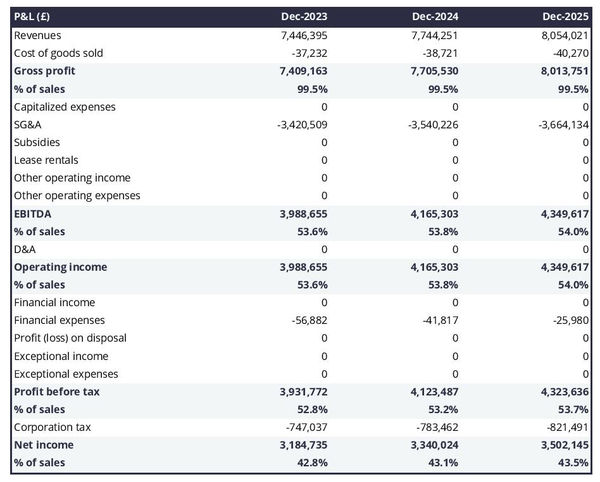
For your waste management company to be financially viable, your projected P&L should ideally show:
- Sales growing above inflation (the higher the better)
- Profit margins which are stable or expanding (the higher the better)
- A net profit at the end of each financial year (the higher the better)
This is for established waste management company, there is some leniency for startups which will have numbers that will look a bit different than existing businesses.
The projected balance sheet
Your waste management company's projected balance sheet provides a snapshot of your business’s financial position at year-end.
It is composed of three types of elements: assets, liabilities and equity:
- Assets: represent what the business possesses including cash, equipment, and accounts receivable (money owed by clients).
- Liabilities: represent funds advanced to the business by lenders and other creditors. They include accounts payable (money owed to suppliers), taxes payable and loans from banks and financial institutions.
- Equity: is the combination of what has been invested by the business owners and the cumulative profits and losses generated by the business to date (which are called retained earnings). Equity is a proxy for the value of the owner's stake in the business.
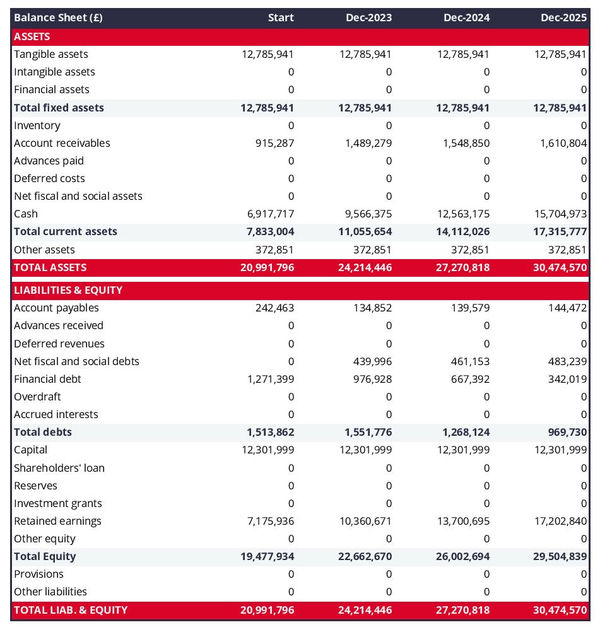
The cash flow projection
The cash flow forecast of your waste management company will show how much cash the business is expected to generate or consume over the next three to five years.
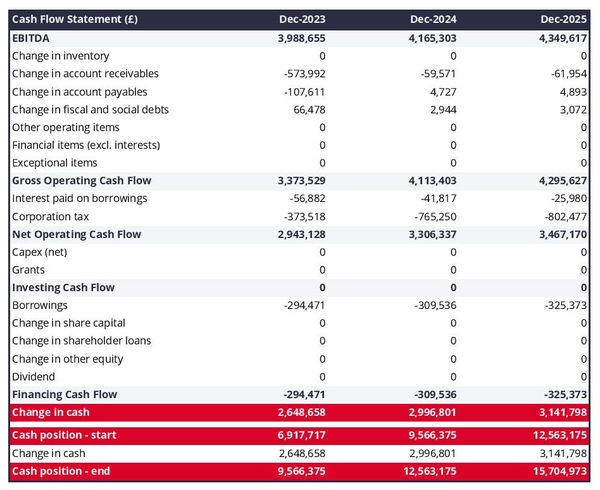
There are multiple ways of presenting a cash flow forecast but from experience, it is better to organise it by nature in order to clearly show these elements:
- Operating cash flow: how much cash is generated by the waste management company's operations
- Investing cash flow: what is the business investing to expand or maintain its equipment
- Financing cash flow: is the business raising additional funds or repaying financiers (debt repayment, dividends)
Your cash flow forecast is the most important element of your overall financial projection and that’s where you should focus your attention to ensure that your waste management company is adequately funded.
Note: if you are preparing a financial forecast in order to try to secure funding, you will need to include both a yearly and monthly cash flow forecast in your waste management company's financial plan.
Need a convincing business plan?
The Business Plan Shop makes it easy to create a financial forecast to assess the potential profitability of your projects, and write a business plan that’ll wow investors.

Which tool should you use to create your waste management company's financial forecast?
Using the right tool or solution will make the creation of your waste management company's financial forecast much easier than it sounds. Let’s explore the main options.
Using online financial projection software to build your waste management company's forecast
The modern and easiest way to build a forecast is to use professional financial projection software such as the one we offer at The Business Plan Shop.
There are several advantages to using specialised software:
- You can easily create your financial forecast by letting the software take care of the financial calculations for you without errors
- You have access to complete financial forecast templates
- You get a complete financial forecast ready to be sent to your bank or investors
- You can easily track your actual financial performance against your financial forecast, and recalibrate your forecast as the year goes by
- You can create scenarios to stress test your forecast's main assumptions
- You can easily update your forecast as time goes by to maintain visibility on future cash flows
- You have a friendly support team on standby to assist you when you are stuck
- It’s cost-efficient and much cheaper than using an accountant or consultant (see below)
If you are interested in this type of solution, you can try our forecasting software for free by signing up here.
Hiring a financial consultant or chartered accountant
Hiring a consultant or chartered accountant is also an efficient way to get a professional waste management company financial projection.
As you can imagine, this solution is much more expensive than using software. From experience, the creation of a simple financial forecast over three years (including a balance sheet, income statement, and cash flow statement) is likely to start around £700 or $1,000 excluding taxes.
The indicative estimate above, is for a small business, and a forecast done as a one-off. Using a financial consultant or accountant to track your actuals vs. forecast and to keep your financial forecast up to date on a monthly or quarterly basis will naturally cost a lot more.
If you choose this solution, make sure your service provider has first-hand experience in your industry, so that they may challenge your assumptions and offer insights (as opposed to just taking your figures at face value to create the forecast’s financial statements).
Why not use a spreadsheet such as Excel or Google Sheets to build your waste management company's financial forecast?
You and your financial partners need numbers you can trust. Unless you have studied finance or accounting, creating a trustworthy and error-free waste management company financial forecast on a spreadsheet is likely to prove challenging.
Financial modelling is very technical by nature and requires a solid grasp of accounting principles to be done without errors. This means that using spreadsheet software like Excel or Google Sheets to create accurate financial forecasts is out of reach for most business owners.
Creating forecasts in Excel is also inefficient nowadays:
- Software has advanced to the point where forecasting can be done much faster and more accurately than manually on a spreadsheet.
- With artificial intelligence, the software is capable of detecting mistakes and helping decision-making.
Spreadsheets are versatile tools but they are not tailor-made for reporting. Importing your waste management company's accounting data in Excel to track actual vs. forecast is incredibly manual and tedious (and so is keeping forecasts up to date). It is much faster to use dedicated financial planning tools like The Business Plan Shop which are built specially for this.
Need a convincing business plan?
The Business Plan Shop makes it easy to create a financial forecast to assess the potential profitability of your projects, and write a business plan that’ll wow investors.

Use our financial forecast templates for inspiration
The Business Plan Shop has dozens of financial forecast examples available.
Our templates contain both a financial forecast and a written business plan which presents, in detail, the company, the team, the strategy, and the medium-term objectives.
Our templates are a great source of inspiration, whether you just want to see what a complete business plan looks like, or are looking for concrete examples of how you should model financial elements in your own forecast.
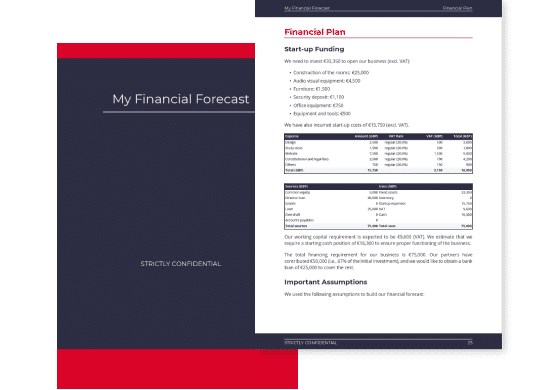
Takeaways
- A financial projection shows expected growth, profitability, and cash generation for your business over the next three to five years.
- Tracking actuals vs. forecast and keeping your financial forecast up-to-date is the only way to maintain visibility on future cash flows.
- Using financial forecasting software makes it easy to create and maintain up-to-date projections for your waste management company.
You have reached the end of our guide. We hope you now have a better understanding of how to create a financial forecast for a waste management company. Don't hesitate to contact our team if you have any questions or want to share your experience building forecasts!
Need a convincing business plan?
The Business Plan Shop makes it easy to create a financial forecast to assess the potential profitability of your projects, and write a business plan that’ll wow investors.

Also on The Business Plan Shop
- Example of financial projections
- How to create a sales forecast for a business?
- Example of financial forecast for business idea
Know someone who runs or wants to start a waste management company? Share our financial projection guide with them!


